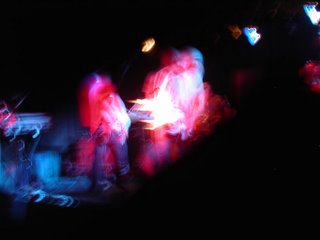I realize most people do not consider Tuesday to be part of the weekend but this blog is all about challenging the way people think and I’m sick and tired of making apologizes for delayed Maritime-themed blog entries so, without further ado: On Thursday, Kevin, Carrie, and I arrived at the 7th Street Entry just shy of 9 PM. I was rather dismayed to read the posted set times of “Ada Jane – 9:30”, “Bound Stems – 10:30”, and “Maritime – 11:30”, especially after I had called First Ave earlier in the evening and received approximate set times of 9:00, 10:00, and 11:00. I later remarked to Kevin that I could only name one difference between the evening’s show and the Art Brut concert the two of us had attended at the Entry a few months earlier for which doors opened and
Ada Jane specializes in the type of country influenced folk that bores me to an extent more or less unparalleled by all other genres. To make matters worse, the front man continuously made uneasy references to the band’s absent bass player. I spent a good portion of the set pondering whether the bass player decided to stand up his bandmates during a high exposure gig opening for a national touring act or whether the venue simply wanted to maximize potential drink sales so badly that it unflinchingly booked two thirds of a relatively unknown local trio to open. The lone highlight of the set was a series of three or four fast paced rock songs played in succession which briefly garnered the audience’s enthusiasm. Sadly, the lead singer confessed immediately thereafter that the duo did not have anymore rock songs in their repertoire and again lulled the crowd to sleep, this time for the duration of the performance.
Whether it was the elaborate artificial ivy decorating the stage, the wide array of instruments on display, or the sheer number of performers, Chicago’s The Bound Stems exuded a vibe which left no doubt the band’s set would be a success prior to even taking the stage. Maritime’s Flameshovel labelmates offered a unique combination of ragged post-rock paired with irresistible male-female vocals. I can write with relative certainty that I have never seen a band take such delight in performing. In fact, on several separate occasions, frontman Bobby Gallivan could not help but rhythmically pat multi-instrumentalist Janie Porch on the shoulder and grin uncontrollably as the two sang in unison. Sadly, I later discovered in a devastating turn of events that Porch appears on neither The Logic of Building the Body Plan EP, the Stems only release currently available, nor the outfit’s forthcoming full length. Nevertheless, I still plan to investigate band’s first two records and eagerly anticipate attending a Bound Stems show after I relocate to the
I envisioned the first three songs of Maritime’s set in a dream. Well…that’s a little bit of an exaggeration. In actuality, after repeated listenings to The Glass Floor in the days prior to the show, I realized (while awake) that “The Window Is The Door” would be the most sensible opener because the song is phenomenal, represents the first track on one of the band’s two releases, and features slow pacing which would bog down what figured to be an otherwise upbeat set heavy on material from We, The Vehicles. “Calm” would logically take things up a notch next as opener 1B and it would be unthinkable to break up the mini suite I praised at such great length in Part II, meaning that “Tearing Up The Oxygen” would be the band’s third song. As soon as the recently reconfigured quartet took the stage with drummer Dan Diddier manning the keys, the deal was sealed.
While “The Window Is The Door” was predictably gorgeous, “Calm” and “Tearing Up The Oxygen” represented the evening’s greatest disappointment aside from the forty five tedious minutes during which Ada Jane was onstage. The band appeared to suffer from the rust and over exuberance of playing its first gig in months. Both songs were ragged and “Tearing Up The Oxygen” in particular suffered from a r egrettably fast tempo that smothered the tune’s irresistible pop gloom. Perhaps due to a lack of proper warm ups, Davey von Bohlen’s vocals were not only rushed but repeatedly off key. What happened next was every bit as shocking as the magnificence of We, The Vehicles: the band righted the ship with a performance of “We Don’t Think, We Know” – the same song I labeled the poorest track on the album in part two of this series – and from that point forward, never looked back. The best offerings on We, The Vehicles soared as “No One Will Remember You Tonight” offered redoubled brooding intensity and “Don’t Say You Don’t” went over so well the band jokingly threatened to launch into the song for a second time. Perhaps more impressively, middling tracks from Glass Floor such as “Someone Has To Die” and “All My Days Go By” (which I swear Davey incorrectly referenced as “If You Want To Go Out”), greatly benefiting from a louder attack and quickened pace, seamlessly fit alongside the expertly crafted material from We, The Vehicles.
egrettably fast tempo that smothered the tune’s irresistible pop gloom. Perhaps due to a lack of proper warm ups, Davey von Bohlen’s vocals were not only rushed but repeatedly off key. What happened next was every bit as shocking as the magnificence of We, The Vehicles: the band righted the ship with a performance of “We Don’t Think, We Know” – the same song I labeled the poorest track on the album in part two of this series – and from that point forward, never looked back. The best offerings on We, The Vehicles soared as “No One Will Remember You Tonight” offered redoubled brooding intensity and “Don’t Say You Don’t” went over so well the band jokingly threatened to launch into the song for a second time. Perhaps more impressively, middling tracks from Glass Floor such as “Someone Has To Die” and “All My Days Go By” (which I swear Davey incorrectly referenced as “If You Want To Go Out”), greatly benefiting from a louder attack and quickened pace, seamlessly fit alongside the expertly crafted material from We, The Vehicles.
In yet another surprising outcome, the highlight of the show may have been the effervescence exhibited by Maritime’s front man Davey von Bohlen. Some unflattering rumors about von Bohlen surfaced after The Promise Ring’s Wood/Water was met with disapproval from the band’s fan base and Maritime’s inauspicious beginnings did little to rebuild Davey’s reputation. I must admit that my eyebrows were raised when in the months after the release of a tremendous new Maritime album, the only interviews I could locate on the internet were conducted with Didier or departed bass player Eric Axelson and not the band’s lead singer, guitar player, and primary songwriter. However, I kid you not when I say that the man could not have been more of a delight. Davey performed with ample energy, shimmying lightheartedly across the stage on several different occasions. While extended bouts of silence to allow for tuning occurred early  on, Davey soon picked up the pace with hilarious and charming anecdotes about Paul Simon, his inability to tune a guitar, and being lectured by a college professor who constantly remarks “You don’t understand. Just several years ago, everyone did not own a cell phone!” After the conclusion of the set, the man himself responded to my cry of “Davey, I was hoping for an encore!” by walking right up to me, placing his arm around my shoulder, and deadpanning “I know. I was trying to talk you out of it.” He then proceeded to regale Kevin and myself with self deprecating insight on the recording of his vocals and an unforgettable story about the reason the band no longer attempts “Adios” in concert.
on, Davey soon picked up the pace with hilarious and charming anecdotes about Paul Simon, his inability to tune a guitar, and being lectured by a college professor who constantly remarks “You don’t understand. Just several years ago, everyone did not own a cell phone!” After the conclusion of the set, the man himself responded to my cry of “Davey, I was hoping for an encore!” by walking right up to me, placing his arm around my shoulder, and deadpanning “I know. I was trying to talk you out of it.” He then proceeded to regale Kevin and myself with self deprecating insight on the recording of his vocals and an unforgettable story about the reason the band no longer attempts “Adios” in concert.
What follows is an undeniably cheesy conclusion to this three part series and perhaps largely the result of fatigue but after spending multiple hours authoring these entries, my one and only hope is that the few readers I have will take the time to download a few tracks from We, The Vehicles. I do not offer such unbridled support of an album lightly and spending a brief amount of time in the presence of the band and most notably Davey leaves me convinced that such an amazing work could not have come from a much nicer group of guys. I suppose this axiom of mine has been proven false in other instances, but I firmly believe that due to the quality of the songwriting and performances, anyone who gives We, The Vehicles a legitimate chance will come to love at least several different moments throughout the course of the album.











